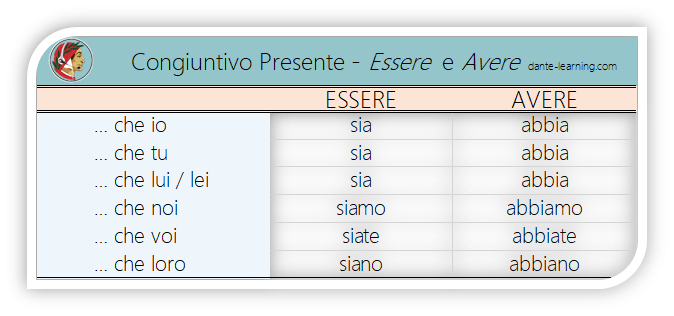First blog, quiz and audio of a series about the Congiuntivo
Congiuntivo presente of Essere and Avere
At the beginning of your Italian classes, you probably learned the tenses of the indicativo, such as the presente, passato prossimo, imperfetto etcetera. If you are familiar with the tenses of the indicativo, it’s time to learn the congiuntivo presente and express a wider range of concepts and situations in Italian.
We can simplify and say that whereas the indicativo is the mood of reality, the congiuntivo is the mood of possibility, uncertainty and opinion.
There are four tenses of the congiuntivo:
- presente
- passato
- imperfetto
- trapassato
Today we are going to study the congiuntivo presente of essere and avere. This will come in handy when we’ll approach the congiuntivo passato.
Look at the sentence
- Penso che Fabio sia un bravo ragazzo.
Instead of
“Penso che Fabio è un bravo ragazzo”
we need to use the congiuntivo sia.
- I’m expressing my personal opinion about Fabio, not a fact;
- I think now that Fabio is a good guy, so I have to use the presente tense.
The congiuntivo needs
- two sentences (clauses) connected with the word che (that). Io penso is the main sentence, che Fabio sia…is a dependent clause.
- two different subjects (io & Fabio in this case)
- a verb expressing a thought, emotion, opinion, desire… not a fact
- the congiuntivo is always in a dependent clause
There are some exceptions to these four “pillars” of the congiuntivo, but in most cases we need all these conditions for the congiuntivo to be necessary. If one is missing, depending on the sentence, the congiuntivo is redundant.
For example, when the subject of the two clauses doesn’t change, the congiuntivo is not necessary:
Fabio (he) thinks he‘s a good guy:
- Fabio pensa di essere un bravo ragazzo.
Let’s see the present tense of essere and avere

PLEASE NOTE

The following rules apply to the congiuntivo, regardless of the tense we want to use. Please keep this first blog as a reference. The same rules are valid for the next tenses we are going to study.
- un’opinione (opinion) – Pensano che Luigi abbia un buon cuore.
- un’incertezza (uncertainty) – Non sappiamo se i tuoi amici siano delle persone oneste.
- una speranza (hope) – Speriamo che tu abbia il tempo di venire alla festa.
- una volontà (will) – Voglio che il lavoro sia pronto alle 10 di domani.
- un timore (worry) – Ho paura che Michele non abbia abbastanza soldi.
- un dubbio (doubt) – Il mio capo non è sicuro che il nuovo ufficio sia adatto.
after impersonal expressions, often times with the verb “essere”
“è bene che”, “è difficile che”, “è facile che”, “è giusto che”, “è necessario che”, “è possibile che”, “occorre che”, “peccato che”, “è impossibile che”, “è improbabile che”, “è probabile che”, “non è giusto che” etc…
- È possibile che Mauro abbia l’influenza.
- Occorre che tu sia più paziente.
- Non è giusto che loro abbiano un lavoro così pesante.
after feelings
“mi dispiace che”, “siamo contenti che”, “è un peccato che”, “lui è felice che” …
- Mi dispiace che Davide sia triste.
- Siamo contenti che i nostri amici abbiano una casa nuova.
- Sono felice che i miei nonni siano in buona salute.
after a superlativo relativo
- Carlo è l’amico più simpatico che io abbia.
after an indefinite adjective or pronoun
such as chiunque, qualunque, ovunque, qualsiasi…
- Chiunque sia al telefono, ditegli che sono occupato.
- Qualunque malattia abbia Luigi, non è grave.
Introducing a concession (frasi concessive)
with nonostante, malgrado, sebbene, benché etc…
- Nonostante abbiate poco tempo, studiate sempre l’italiano. Bravi!
- Benché sia malato, sono andato ugualmente in ufficio.
There are other minor cases and expressions that require the use of the congiuntivo. We can see them together during our Skype classes.
Please try the quiz for more details about the congiuntivo presente of essere and avere and check your final score.
- 1
- Answered
- Review
-
1. Question
Complete the sentences with the
Congiuntivo Presente of Essere and Avere
Correct pronunciation in the answer

-
- Penso che il gatto (avere) fame.
- Non siamo sicuri che domani ci (essere) il sole.
- Mi pare che oggi voi (essere) molto stanchi.
- Vi faremo quel prestito, a condizione che (essere) onesti.
- Sembra che Laura (essere) più felice dopo il matrimonio.
- Siete gli amici più cari che noi (avere) .
- Chiunque (essere) pronto per l'esame di italiano, deve iscriversi.
- Speriamo che le mie amiche (essere) in orario per la cena.
- Voglio che Luciano (avere) qualunque cosa desideri.
- Non siamo sicuri che il prossimo fine settimana i miei genitori (essere) liberi
-
